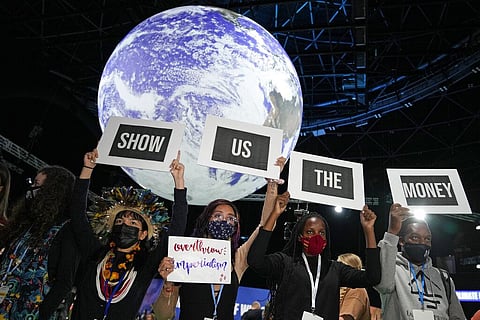

New Delhi, Dec 13 (PTI) The United Nations' climate conference in Glasgow kept alive the ambition to limit global temperature rise to 1.5 degrees Celsius but it was a "fragile win", COP 26 president Alok Sharma said on Monday while calling for rapid global action.
In his virtual address at the Partnership Summit organised by Confederation of Indian Industry (CII), Sharma said that climate action requires change across the real economy and can only succeed with businesses on board.
Speaking at a session on 'Climate Action: The Road Beyond COP26 Glasgow', he said that countries and companies must honour the promises made at the conference.
Hailing the several commitments and announcements made at COP 26 like the Green Grid initiative -- 'One Sun, One World, One Grid (OSOWOG)' -- launched by India and the UK, the commitment of countries to phase down coal power and phase out non-fossil fuel subsidies, commitment of developed countries to double finance for climate adaptation by 2025, among others, Sharma said it brings countries back to the table next year to revisit and strengthen the 2030 emission reduction targets necessary to align with the Paris Agreement temperature goal.
"Together, with those commitments made outside the negotiating halls, the Glasgow Climate Pact keeps the 1.5 degrees Celsius limit within reach. But this is a fragile win. Of course, 1.5 degree lives but its pulse continues to be weak and will only survive with rapid global action.
"That means, delivery is the order of the day. Countries and companies must honour the promises made at COP 26 and the governments must deliver on the expectation of the Glasgow Climate Pact by taking action to phase down coal by strengthening their emission reduction targets by the end of 2022 and for developed countries by delivering on the finance and this is going to be my focus for the next year," he said.
He also said that for driving the commitments that were made at COP 26 into actions during 2022 and beyond, "my request to companies around the world and in India is to work with us, help us, support us on this journey. Governments need to know that business is behind the net zero world."
Citing COP 26 as a pivotal movement for nations, he stated, "The green economy presents enormous opportunities for businesses and countries and working together can achieve the changes we need. Looking at all the announcements made at COP26, we now have 90 per cent of the global economy covered by net zero commitments, and this compares to less than 30 per cent when we took on the role of organising COP26 two years ago."
Stating that governments need to know that business is behind a net-zero world, he urged industries across the board to join the 'Race to Zero' campaign, commit to short-term targets based on science and take action across the supply chain, utilise purchasing power and encourage suppliers to set their own 2050 net zero targets.
Revisiting his speech at last year's CII Partnership Summit, Sharma said that by working together, required changes can be achieved.
"As I said then, by working together, we can achieve the change we need. We did see this at UNFCCC COP 26, held just a few weeks ago in Glasgow. I do believe this was a pivotal moment for our planet. And going into it, we knew that it was our last hope of keeping alive the ambition of limiting the rise in global temperature to 1.5 degrees Celsius, which as scientists said, will avoid the worst effects of climate change.
We know that the higher the temperatures rise, the more severe we see the heat waves and rainfalls across South Asia.
"So keeping the 1.5-degree limit alive was very much a key challenge for COP 26. Collectively, we have delivered with governments, businesses and financial institutions, we have worked together," he said.
Speaking at the CII summit, Environment Secretary Rameshwar Prasad Gupta said India's COP 26 commitments, including becoming net zero by 2070 and increasing the renewable energy capacity to 500 gigawatt (GW) before the deadline of 2030, are ambitious yet achievable.
"India's commitments are very ambitious yet very much achievable," Gupta said.
He said that while global discussions like those at COP26 are important, a more tangible arena for climate action now lies at national and sub-national levels and across businesses and the industry.
"The revised pledges and net-zero commitments by countries have reposed trust in the idea of national and sectoral action for a resilient future," he said.
Bringing to light the importance of addressing concerns on a cross-sectoral scale, he said that the road ahead is to expand clean energy options while making them affordable, accessible, and attractive across all sectors by 2030.
"Focus must shift to steel, power, road transport, hydrogen, and agriculture -- which together account for more than half of global emissions," he said.
R Mukundan, Chairman CII Environment Committee and Managing Director and CEO, Tata Chemicals, India, observed that deliberations at COP 26 should now ensure climate justice with a transition that leaves no one behind.
"It must enable countries affected by climate change through adaptive measures to protect communities and natural habitats; protect and restore ecosystems; and build defenses, warning systems and resilient agriculture practices and infrastructure to avoid loss of homes, livelihoods, and lives in the near future," he said.